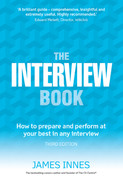Mental preparation
Most of my clients are understandably nervous about attending job interviews.
We’ve already talked about preparing yourself on a practical basis; now it’s time to talk about your mental preparation. You’ve got to get yourself into the right frame of mind.
Nerves
Nerves can often be a useful tool for sharpening up your performance. However, if your nerves take over to the extent that they interfere with your ability to come across professional at interview, then it’s clearly a problem.
Nerves are commonly caused by your having lots of negative thoughts rattling around in your brain. Try to relax, calm your anxious mind and think positive thoughts. Remember: everyone gets nervous to some degree before an interview. It’s perfectly normal.
The better prepared you are, the less likely you are to feel panicky, but you’ll never completely eliminate nerves. The secret is to channel your nervous energy and use it to your advantage. Take a deep breath, focus, concentrate and don’t let nerves spoil your day. In any case, most professional recruiters are trained to make allowances for the fact that you are likely to be a little on edge.
TOP TIP
Bear in mind that you always feel more nervous than you actually look. Once you realise this, you should feel a lot calmer.
Attending an interview isn’t much different from going on a date, really, although in this instance, imagining them in their underwear is good for calming your nerves.
On a serious note, it’s natural for you to feel threatened by an interview and for your body to be pumped full of adrenaline, and adrenaline isn’t your best friend when you’re trying to present yourself to the best of your ability! It might have been useful hundreds of thousands of years ago when you were cornered by a sabre-toothed tiger, but now it’ll just cause you to panic even more!
Here are my top 10 key tips for calming those nerves:
- Stop thinking about yourself. Focus your attention on your interviewer(s).
- The interviewer is not your enemy!
- Talk to the interviewer as you would in a one-on-one conversation with anyone else, not as someone interviewing you.
- Ask questions to reinforce this – don’t just let them ask all the questions.
- Have a glass of water to sip from just in case your mouth (or brain!) dries up.
- Take slow, deeper breaths. It’ll calm you down and help get more oxygen to your brain.
- Smile; it’s a natural relaxant, and it’ll make a good impression on your interviewer too.
- Limit your caffeine intake; you definitely don’t want to appear overly manic.
- Visualise the end of the interview and walking back out to freedom!
- Ask yourself, what’s the worst that could happen; after all, it’s just an interview!
Confidence
Confidence is critical to a successful interview. It is important not to go to the other extreme and appear overconfident or arrogant, which is a surprisingly common mistake. You simply need to appreciate what your strengths are and to value yourself accordingly.
Confident people inspire confidence in others; it’s almost contagious. If you appear confident that you are able to do the job, the employer will be more inclined to believe that you can.
If you have been invited for interview then you obviously have something that appeals to them. Interviews are an expensive and time-consuming process and they wouldn’t be making the effort unless they felt you had significant potential.
Enthusiasm
Enthusiasm in an interview is essential, but there’s a fine balance. Don’t overdo it! Recruiters often find that the person they are interviewing lacks enthusiasm; this will count against you. Sometimes it might just be due to nerves and shyness; don’t let this happen to you. Be enthusiastic, and show it. If you’re not enthusiastic about the role and about the organisation, then you won’t do yourself justice. This is one of the easiest things to get right. As with confidence, enthusiasm is a trait that is guaranteed to impress an interviewer.
Show you are motivated. Talk about your work with enthusiasm. Demonstrate that you are keen to do your best.
Tone of voice
Nerves, confidence and enthusiasm will all be reflected in the way you speak. Nerves, stress and pressure will have a negative impact, whilst confidence, enthusiasm and energy will come across positively.
Take some time prior to your interview to work on your tone of voice. You might feel a little mad talking out loud to the mirror but it’s an exercise that’s well worth trying!
Keeping a smile on your face will also help. We’ll cover that in more detail in Chapter 6: Body language.
